A new police deal between China and Solomon Islands is causing confusion and concern
New police deal between Beijing and Honiara causes confusion and concern over Chinese influence in the Pacific nation, where Australian police have been on the ground for decades
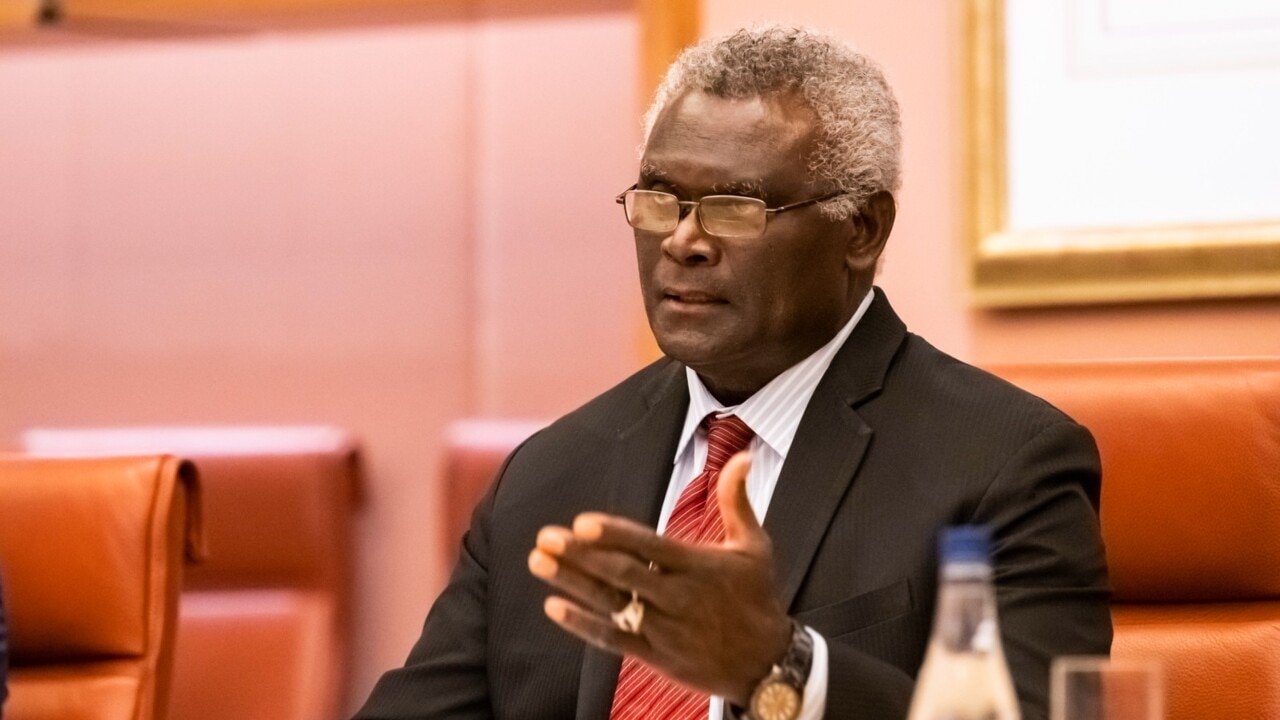
In a modest two-storey building surrounded by barbed wire on the main road in Honiara, 70 Australian Federal Police officers work side by side with Royal Solomon Islands Police Force officers.
Some 500m down the road, nine Chinese police officers based in the embassy of the People’s Republic of China are also assigned to work with Solomon Islands police, in an advisory and assistance role.
They occasionally make appearances at an office set aside for them in the Rove police headquarters, where Honiara’s police force is based, and where AFP members work day by day.
Unlike the Australian police, the Chinese officers are not armed and do not patrol or take part in frontline policing duties.
But a new, three-year policing agreement between Solomon Islands and China in July could change that. The agreement, signed in Beijing after Solomons Prime Minister Manasseh Sogavare met Chinese Premier Li Qiang, has not been made public, and the Solomons government is declining to reveal what expanded role it has given Chinese police.
Mr Sogavare was in Vanuatu this week to attend the Melanesian Spearhead Group Leaders Summit. His spokesman told The Australian that he could not give an update on the July policing deal because only Mr Sogavare or the policing minister were authorised to comment.
The deal has caused deep unrest in Australia and across the Pacific, where some see it as another step by China to securitise the strategically valuable Solomon Islands, 2000km northeast of the Australian coast.
Since the Solomons switched diplomatic relationships from Taiwan to China in 2019, Beijing has been expanding its footprint there. China is building – and paying for – a $74m stadium in Honiara that will host the Pacific Islands Games in November.
It’s the most visible of China’s many projects in the Solomons, an archipelago of almost 1000 islands that is one of the poorest countries in the Pacific and which has significant development needs.
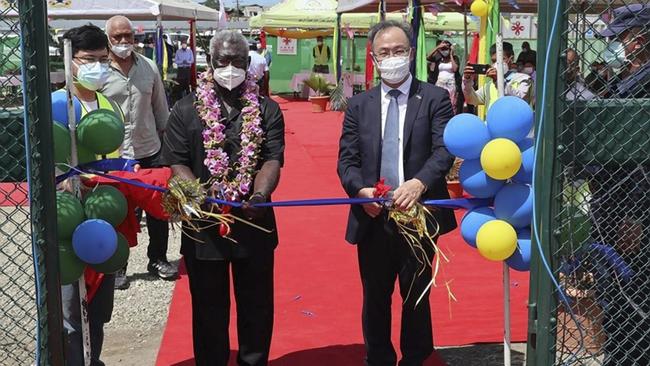
The new policing agreement was one of nine deals signed by Mr Sogavare when the two countries upgraded their diplomatic relationship to a “comprehensive strategic partnership’’.
It came despite Australia providing policing resources, advisory and training to the Royal Solomon Islands Police Force for decades, and having a current policing and security agreement that was signed in 2017 and runs until the end of this year.
When residents of the island Malaita came to Guadalcanal and engaged in violent anti-government protests in November 2021, objecting to the Sogavare government’s decision to sever ties with Taiwan for China, burning down the Chinatown district in Honiara and killing four people, it was Australia to which the Solomons government turned for help to restore order. Armed AFP officers were deployed on to the streets.
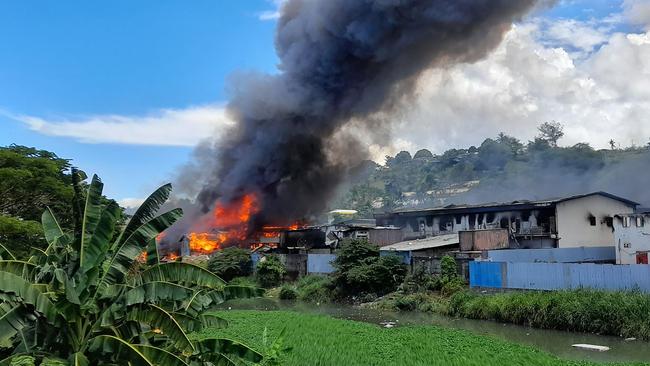
Weeks later, the Solomons government invited a small contingent of Chinese police officers to assist in capacity building the local police force, which numbers just 1500 officers, despite a population of around 725,000. July’s policing deal expands on that earlier agreement in ways that are yet to be explained. “You basically have two rival police forces there,’’ one Canberra source said.
The director of the Lowy Institute’s Pacific Island Program, Meg Keen, said Chinese police had been training local police and providing them with equipment such as vehicles and water cannons.
“There are also arrangements for Chinese military to deploy to Solomon Islands if requested. These arrangement mirror those with Australia (but) PM Sogavare has stated that Australia remains the security partner of choice,’’ Professor Keen said.
“This raises significant issues of interoperability and co-ordination if a rapid response is required to deal with social unrest.
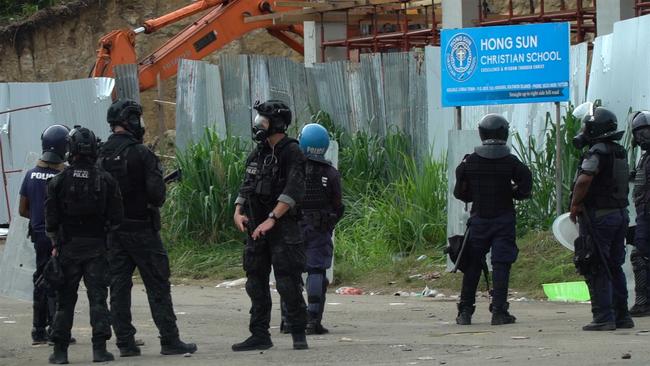
“The upcoming Pacific Games and elections early next year require a well-integrated security force. Difficulties could arise as the Chinese and Australian approach to policing is different and not necessarily compatible.
“It creates potential weaknesses when the forces have not trained together like the Pacific Islands Forum members (Australian, New Zealand and Pacific Islands nations) have over many years, and when the policing approaches are incompatible.
“There are also regional agreements that in times of law and order crises, PIF members will be called on first, before other security partners. These arrangements with the Chinese could challenge that regional agreement (Biketawa Agreement).”
The PIF leaders meeting in 2022 reaffirmed a “Pacific family-first approach to peace and to security.’’
China Pacific politics expert, Anne-Marie Brady, from New Zealand’s University of Canterbury, said two external police forces – Australia and New Zealand – had been on the ground for some time in Honiara but had been working together.
She said Beijing was interested in Solomon Islands because of its geographic location in the second island chain in the Pacific.
“If China can establish a military and intelligence presence in the second island chain, it will significantly change the strategic order which has prevailed in the Pacific since the end of WWII,’’ Professor Brady said.
“The 2021 New Zealand Defence Assessment asserts that if a state that did not share New Zealand’s values and security interests – aka the PRC – set up a military base or dual-use facility in the Pacific, it “would fundamentally alter the strategic balance of the region”.
Australia’s 2020 Strategic Update says it is very concerned by the potential of “the establishment of military bases, which could undermine stability in the Indo-Pacific and our immediate region”.
In early 2022, the security deal between Honiara and Beijing appeared to allow China to make ship visits to Solomons, leading to concerns from Australia, New Zealand the US that a Chinese navy base could be established there. Mr Sogavare ruled that out.
Some Pacific-watchers believe that with many Pacific nations having either no defence forces or only very small military assets, policing is the frontline of national security, and the Solomons represents “ground zero’’.
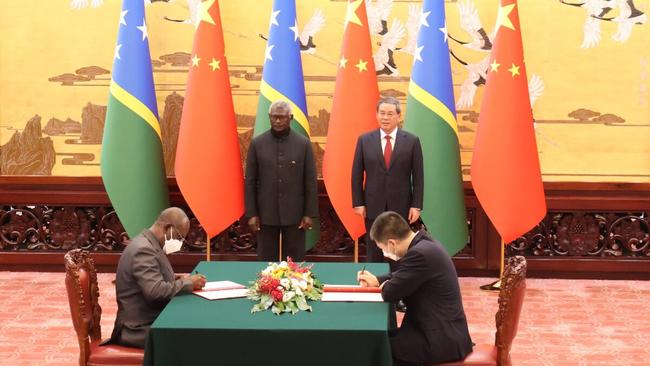
The AFP has in recent times provided 60 Daniels Defence MK18 semi-automatic rifles to Solomon Islands police responding to high-risk security incidents, and also provided vehicles, trucks, vehicle maintenance, tactical response kit and others pieces of vital police equipment. Australia has donated fire and rescue trucks, and provided crime scene and other forensic training. As well as their work at Rove, the AFP maintains a compound near the airport outside Honiara, where they work with Solomon Islands police.
At the time the rifles were handed over late last year, Australia high commissioner to Solomon Islands Lachlan Strahan talked up the “longstanding security and policing partnership’’ between the Solomons and Australia.
“We have been with each other through thick and thin. As Prime Minister Sogavare has said, our partnership is based on our shared duty to ensure that our region remains peaceful, prosperous and stable,” Dr Strahan said.
A look through the social media accounts of the AFP and RSIPF shows Australian police have been taking part in activities that look less to do with policing and more to do with soft power: presenting bibles to police recruits and victim support packs to a care centre, school visits, even rubbish clean-ups.
The AFP recently marched in a parade alongside their Solomon Islands police comrades to mark the formal countdown to the Pacific Islands Games in Honiara.
And AFP Commissioner Reece Kershaw and the force’s Assistant Commissioner for Pacific Asia Command, Nigel Ryan, were in Honiara to attend a 20-year commemoration of the RAMSI mission.
Australia is seeking to extend the 2017 bilateral security treaty, the protocol which allowed the AFP to be quickly deployed on to the streets of Honiara when the riots erupted in 2021, before it expires in December.
Canberra also wants to see the details of the policing deal that Mr Sogavare’s government signed with China.
The Australian government declined to comment, but has previously expressed concern about the arrangement, with Foreign Minister Penny Wong calling for “transparency’’ from China and Solomon Islands over the deal.
“Pacific leaders in the PIF, of which we are a member, have said very clearly that security should be provided from within the Pacific family,’’ Senator Wong said in July.
In a press release that month, the Solomons government said the Police Co-operation Agreement with China would strengthen the local police force and “has nothing to do with ongoing geopolitical bickering by some of the country’s traditional alliances’’.
“It is a three-year agreement that complements the Pacific country’s police co-operation with Australia and New Zealand aimed at increasing the RSIPF’s capabilities and will contribute to eventual self-reliance,’’ it said.
How complementary the deal would be to the Australian-New Zealand police forces remains highly contested. There appear to be no circumstances in which the AFP would work jointly with armed, operational police officers from countries that do not share Australia’s democratic values.
Photographs of the two police contingents in the same place at the same time in Solomons are difficult if not impossible to find.
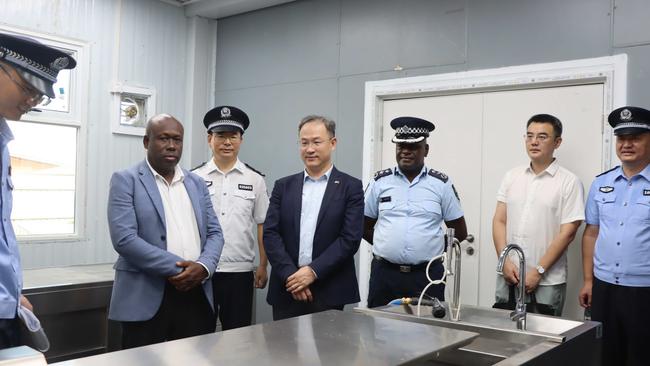
Defending the new China deal, Mr Sogavare said it included training and capacity building for the local police force, including in response to public emergencies, establishment of digital communication systems and a forensics lab, cyber security, and major event security. “The US and Australia had nothing to fear from the police co-operation agreement with China,” he said.
A press release from his office in July said the deal would be complementary to Australian and New Zealand policing programs.
“No one has a monopoly of knowledge. Solomon Islands co-operation with China and all partners are based on the principles of equality and respect for sovereignty and territorial integrity and non-interference in the internal affairs of each other.
“No country has the right to interfere into Solomon Islands internal affairs,’’ it said. “Respect our sovereignty and right to make our own decisions.”
This week, 22 members of the Pacific Islands Chiefs of Police group will meet in Australia. The group includes Australia, American Samoa, the Cook Islands, Fiji, Kiribati, Nauru, New Zealand and Solomon Islands.
It does not include China.







